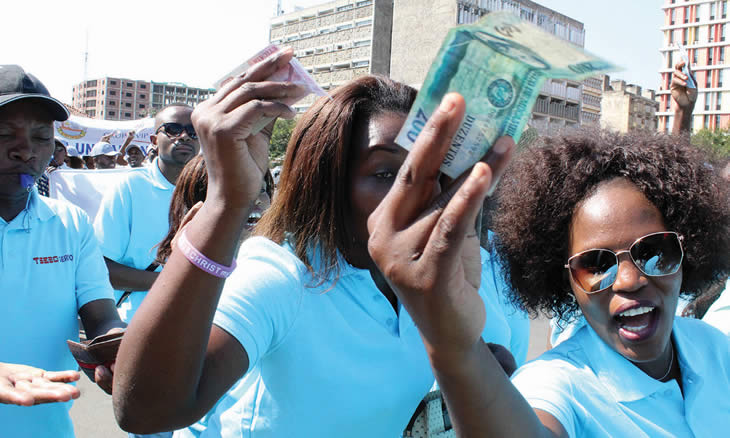Mozambique: H1 State revenue €2.3B, GDP down 3.9% - govt
Minimal increase for an already empty wallet …

Photo: O País
Low wages. That was one of workers’ main protests, one day after the approval of the new minimum wage. On their own day, thousands of workers took to the streets in the city of Maputo to “undress” everything, everything that afflicts them.
It was around 8:30 a.m. when the sun began to awaken in the city of Maputo and celebrations of International Workers’ Day began. Heroes’ Square hosted the customary ceremonial wreath deposition, a ceremony led by Alexandre Munguambe, secretary of the Organisation of Mozambican Workers – Central Syndical, and Minister of Labour Vitória Diogo. The minister acknowledged the existence of challenges in satisfying the workforce, but would commit only to continue working in the defence of workers’ rights.
And because the celebration was really that of the workers, around 9:00 a.m. they positioned themselves in the avenues Guerra Popular, Karl Max and Samora Machel to start the march. Some on foot, others on motorcycles or in light and heavy vehicles they followed along Avenue 25 de Setembro in the indispensable company of the police band.
Creativity was not lacking! Because not all journalists had the opportunity to parade, the media was very well represented by a group of young people wielding microphones and cameras and demonstrating the sacrifices the sector has to face to get information to society.
Heavy vehicles were also used to represent various activities. As for the banners, there was a bit of everything. Responses against low wages, unfair dismissals, discrimination at work and messages of repudiation of the country’s perennial hidden debts.
Also noteworthy were the private security sector workers, many of them with new uniforms but old problems: low wages, lack of overtime pay and conditions inadequate to carrying out their activities.
Those who did not have banners or placards resorted to songs and dances to get their message across. Dressed for the occasion, some in capulanas and others in suits, all danced the dance of protest.
But there are those who went the march not to clamour for better wages but to earn some. Such was Yara Maude from Nampula, charging 20 meticais apiece for face-painting and not lacking clientele. “This face cream is for the face to be smooth. It clears the pimples and stretches the skin,” she said while decorating one client’s face.
Demand for whistles was brisk too, and those seizing the opportunity did not regret it. “They bought loads. I only had only packet left,” one happy seller said.
Why May 1?
World Labour Day was first celebrated in Paris in 1889. The date was chosen to memorialise the general strike of May 1, 1886, in Chicago, the main industrial centre of the United States.
Demonstrations, rallies and speeches rocked the city as thousands of workers took to the streets to protest against inhumane working conditions and demand a reduction of the working day from 13 to 8 hours a day.
But the crackdown was harsh: there were arrests, injuries and even deaths in the clashes between workers and the police.
By Raúl Massingue












Leave a Reply
Be the First to Comment!
You must be logged in to post a comment.
You must be logged in to post a comment.